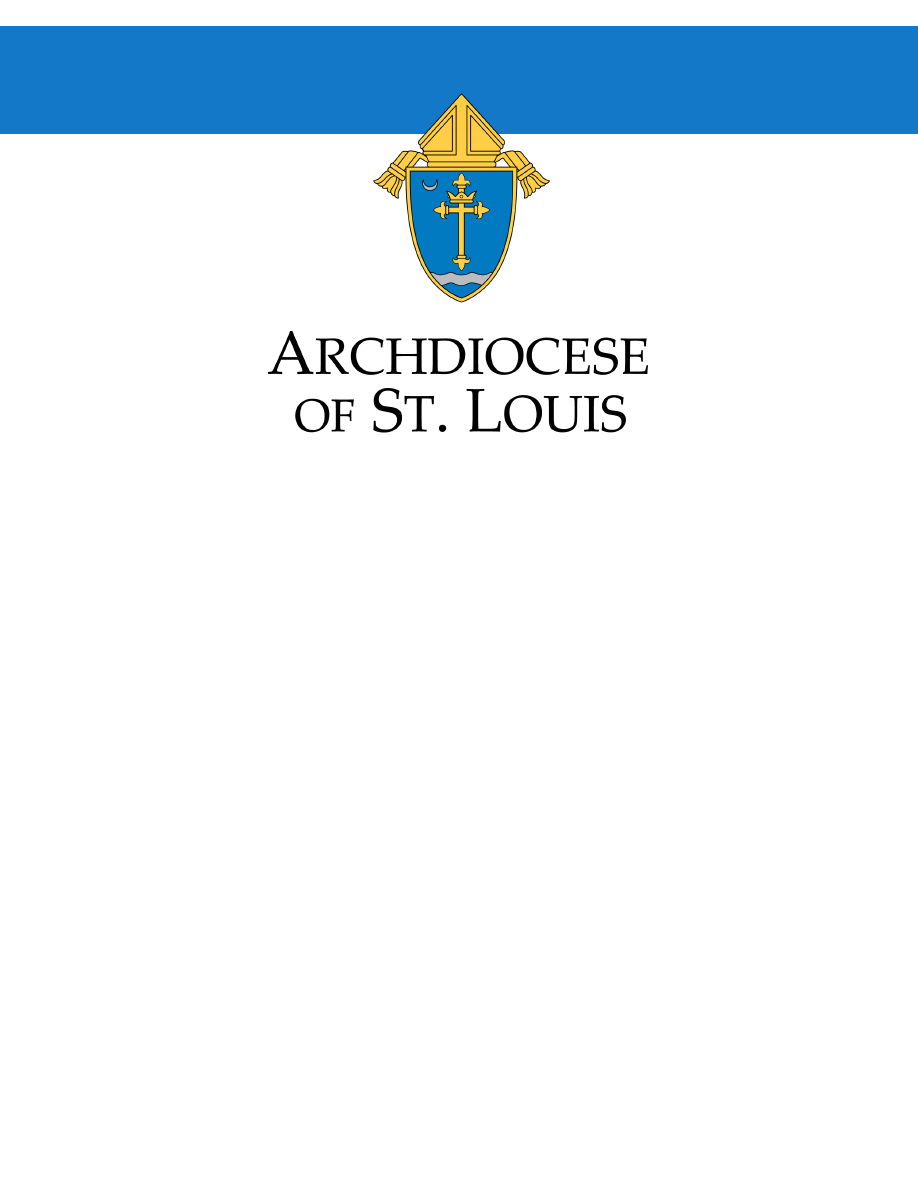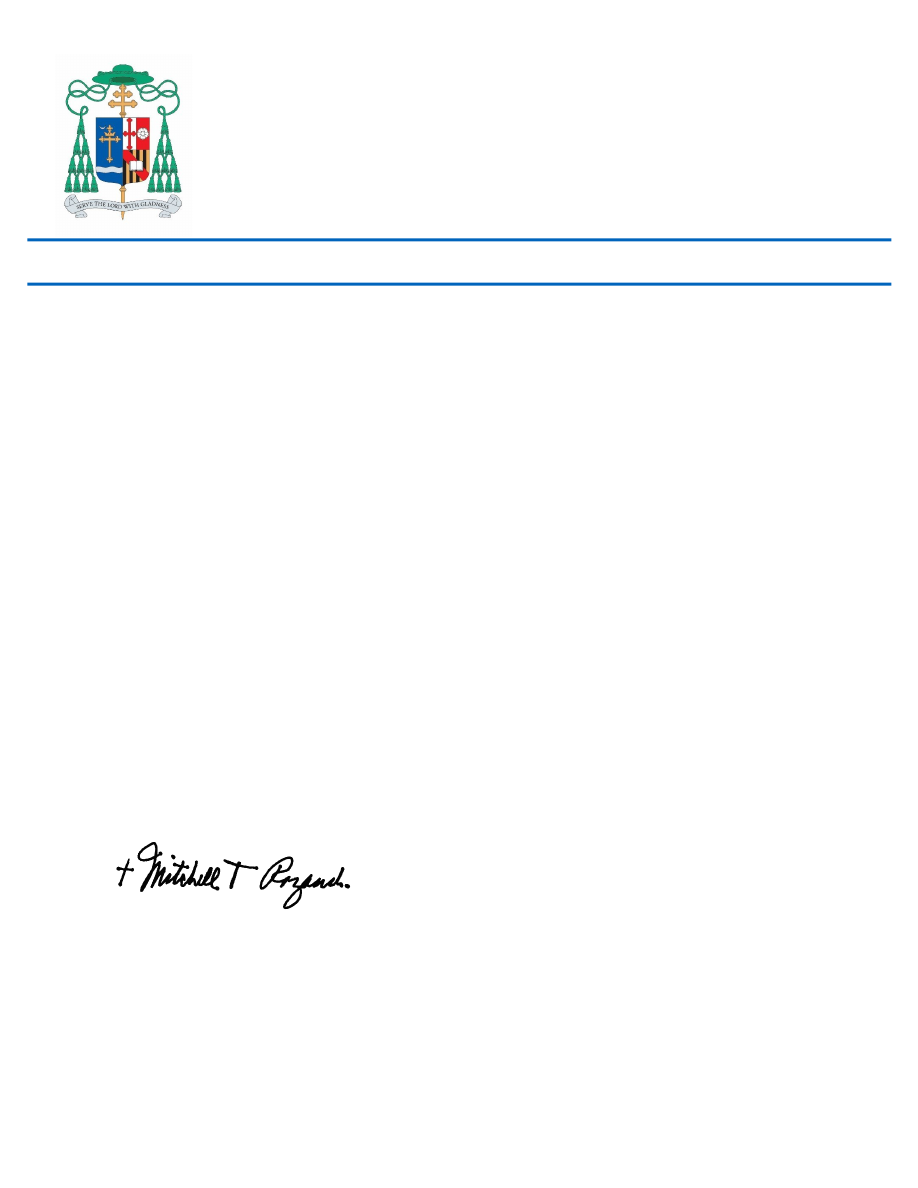Archdiocese of Saint Louis Code of Conduct
The following Code of Ethical Conduct applies to all clergy, employees, volunteers, and agents of the Archdiocese of St. Louis, including those employees of outside organizations who are subcontracted to work at an archdiocesan school, parish or agency.

CODE OF ETHICAL CONDUCT FOR
CLERGY, EMPLOYEES AND VOLUNTEERS
WORKING IN MINISTRY


A
RCHDIOCESE OF
S
T
. L
OUIS
O
FFICE OF THE
A
RCHBISHOP
C
ARDINAL
R
IGALI
C
ENTER
20
A
RCHBISHOP
M
AY
D
RIVE
S
T.
L
OUIS,
M
ISSOURI
63119
P) 314.792.7841
F) 314.792.7842
WWW.ARCHSTL.ORG
On June 14, 2002, the United States Conference of Catholic Bishops approved the Charter for the
Protection Children and Young People. Article six of the Charter requires all dioceses to have
written "standards of ministerial behavior and appropriate boundaries for clergy and for any other
church personnel in positions of trust who have regular contact with children and young people."
On September 26, 2003, Archbishop Justin Rigali promulgated the Archdiocese of St. Louis Code
of Ethical Conduct for Clergy, Employees and Volunteers Working in Ministry, and directed that
it become normative in the Archdiocese of St. Louis.
As your archbishop, I join my predecessors Cardinal Justin Rigali, Cardinal Raymond Burke
and Archbishop Robert J. Carlson in pledging my unwavering commitment to the protection of
children and young people. As I express my commitment to protect children and young people in
the Church, I offer my heartfelt apologies to anyone who has suffered sexual abuse at the hands
of a member of the clergy or any worker in the Church. Through the efforts of the Archdiocesan
Office of Child and Youth Protection, we remain committed to the prevention of sexual abuse
of minors in the Church, to the promotion of safety for children and young people, and to the
ongoing care of those who have suffered sexual abuse.
It is the policy of the Archdiocese of St. Louis that all clergy, employees and volunteers whose
service in the Church brings them into contact with children must complete a national criminal
record check and agree to regular updates. They must also attend a Protecting God's Children
workshop and sign this Code of Ethical Conduct.
The Church relies on the help of God's grace to remain firm in her resolve and effective in her
action to protect children and young people. Let us all pray that we may always express the love
of Christ for children and the most vulnerable in our midst.
Invoking God's blessing upon you and your homes, I remain
Sincerely yours in Christ,
Most Reverend Mitchell T. Rozanski
Archbishop of St. Louis
Reaffirmed November 6, 2020
3

Vulnerable Adult Clarification
I.
Preamble
II. Personal and Professional Interactions
1. General Conduct
2. Integrity
3. Proper Conduct for Instances of
Pastoral Counseling and Spiritual Direction
4. Confidentiality
5. Sexual Conduct
6. Harassment
7. Conflicts of Interest
8. Reporting Ethical or Professional Misconduct
9. Administration
10. Well-being of Clergy, Employees and Volunteers
11. The Use of Electronic Media and Electronic Devices
5
6
7
7
9
10
11
12
13
14
14
15
15
16
TABLE OF CONTENTS
4

5
The ethical conduct outlined in the following pages pertains not only to interactions with
minors but also to those interactions with vulnerable adults over the age of 18 years.
An adult is considered vulnerable when he/she is significantly impaired in the ability to,
or otherwise unable to, protect his/her own rights and vital interests or to report abuse
or neglect without assistance because of physical, mental or emotional impairment.
VULNERABLE ADULTS

It is God who calls people to ministry, therefore, those who serve in the name of the Church
must be models of exemplary behavior. Clergy, employees and volunteers must at all times
be mindful that they bear a tremendous responsibility for the sake of the Gospel. Their
personal and professional conduct can and often does inspire and motivate others to
deepened faith and personal holiness. However, because of the great trust placed in the
Church by God's people, the conduct of the Church's clergy, employees and volunteers
can also damage and diminish the faith of those whom God has entrusted to the Church's
pastoral care.
It is to be understood, therefore, that all who minister, work or volunteer in the parishes,
schools or other institutions, offices or agencies of the Catholic Church must at all times
uphold Gospel values in their personal and professional conduct. Clergy, employees and
volunteers should and will be held accountable for their behavior. They must exemplify
a deep commitment to the Church and its traditions and live with integrity. They must
respect the rights and inherent dignity of every other human person. Valuing the pursuit
of personal, spiritual and intellectual growth, they must seek to maintain a professional level
of competence with regard to the ministry or work entrusted to them.
In order to maintain the highest level of accountability, there must be a clear and definitive
blueprint of appropriate and inappropriate behavior. The intent of this Code of Ethical Conduct
is to provide a set of normative standards of conduct for all clergy, employees and volunteers
engaged in ministerial and other Church-related activities within the Archdiocese of St. Louis.
While this Code is not exhaustive in the variety of situations specifically mentioned, it is to
be understood that the standards set out herein are to be considered normative for every
pastoral or other Church-related setting.
Responsibility for adherence to this Code of Ethical Conduct rests with the individual. Any
member of the clergy, employee or volunteer who violates this Code will be subject to
appropriate remedial action by the appropriate authority in each case. Corrective action may
take various forms depending on the specific nature and circumstance of the offense, including,
but not limited to, an oral or written citation or even removal from ministry, termination of
employment or termination of one's volunteer status.
I. PREAMBLE
6

7
1. GENERAL CONDUCT
Clergy, employees and volunteers (hereinafter referred to as "Church personnel")
working with minors should maintain an open and trustworthy relationship between
the minors and adult supervisors.
1.1 Church personnel must be aware of their own and others' vulnerability when
working alone with a minor. Whether in a social or ministerial situation, the
minor's location and activities should be known by parents or guardians at
all times. Church personnel must also be mindful that minors do not possess
the capacity to make freewill and voluntary decisions.
1.2 Church personnel should use a team approach to managing activities.
In general, at least two adults should be present in situations involving
minors with the exception of sacramental confession.
1.3 Church personnel must always observe the
following regarding interaction with minors:
1.3.1 Church personnel should only meet with a minor where other adults
can have open access to the room. The entry door should either have
a window or be left open. Do not meet with a minor if there are no
other adults in the immediate vicinity.
1.3.2 Never visit a minor's home without at least one other adult present
and without the expressed welcome of a parent or guardian.
1.3.3 Adults providing transportation for parish or archdiocesan-sponsored
events may not be alone in a vehicle with one child. It is permissible for
one adult to provide transportation for two or more minors, but at no
time should one adult be alone with one child in a vehicle. Transportation
arrangements must be made in advance to avoid the possibility of an adult
and minor being alone in a vehicle.
1.3.4 All outings with minors (e.g. retreats, youth group trips, sports-related
activities and overnight trips) require the presence of at least two adults
at all times. Documented parental consent via signed permission form,
handwritten note, or electronic communication must be obtained prior
to the event in order for the minor to attend.
II. PERSONAL & PROFESSIONAL INTERACTIONS

II. PERSONAL & PROFESSIONAL INTERACTIONS
1.3.5 Adults may not share sleeping quarters with minors, unless accommoda-
tions are barrack-style with multiple adults and multiple minors in the
same room. Each adult and each minor must have a separate bed.
1.3.6 Adults may not share locker rooms, shower rooms and
dressing rooms with minors unless another adult is present.
1.3.7 Adults may not accompany minors into restrooms without another
adult present unless circumstances make it absolutely unavoidable.
1.3.8 Minors should be permitted only in the public section
of a rectory, never in the private living quarters.
1.3.9 Minors should never be permitted to stay overnight in a rectory, convent
or religious community, even if alone in a separate guestroom.
1.4 Physical contact with youth can be misconstrued and should occur:
(a) only when completely nonsexual and otherwise appropriate, and
(b) never in private.
1.5 Church personnel should never be involved with the illegal possession and/or
illegal use of drugs and/or alcohol. They must never supply such substances to
minors, nor may they consume alcohol while functioning in an official capacity
with minors. This includes those who are involved as coaches or managers of
youth sports teams.
1.6 Church personnel should not provide shared or private overnight
accommodation for any minors including but not limited to accommodations
in any Church-owned facility, private residence, hotel room or any other place,
unless ample adult supervision is present.
1.6.1 In rare emergency situations when shared or private overnight
accommodation is necessary for the health and well-being of the minor,
Church personnel should take extraordinary care to protect all parties
from the appearance of impropriety and from all risk of harm.
1.6.2 A team approach should always be employed in managing emergency
situations that require shared or private overnight accommodation
for the health and well-being of minors.
8

9
1.7 Physical force or demeaning language should not be used in disciplining minors.
Physical force is only permissible to protect oneself, another innocent party, or
a person who is out of control.
1.8 Prudent caution is to be employed regarding physical displays of affection,
topics of conversation, and language used with minors.
1.8.1 Church personnel must not touch or embrace a minor inappropriately.
This includes physical games such as wrestling or tickling. Touching
and embracing a minor is not appropriate if it could not also be done
comfortably in the presence of the minor's parent or guardian.
1.8.2 Church personnel must not engage in any inappropriate,
sexually-oriented conversation with minors.
1.8.3 Church personnel must not use inappropriate
language or behavior when working with minors.
1.9 Church personnel should not accept expensive gifts from minors, their parents,
or vulnerable adults without prior written approval from the pastor or school
administrator, and archdiocesan agencies.
1.10 Church personnel should refrain from giving expensive gifts to minors without
prior written approval from the parents or guardians and the pastor or school
administrator, and archdiocesan agencies.
2.
INTEGRITY
All Church personnel must adhere to moral and ethical principles
no matter what role or circumstances they find themselves in.
2.1 Church personnel must always protect the interests and rights of those
who are most susceptible to harm, especially minors and vulnerable adults.
2.2 Explicit sexual interactions and sexually suggestive interaction with minors,
vulnerable adults and co-workers are never appropriate and are prohibited.
Church personnel are expected to live a chaste lifestyle that respects self
and others.
2.3 Those who work for or volunteer their service to the Church must
protect the confidentiality and privacy rights of others at all times.

10
II. PERSONAL & PROFESSIONAL INTERACTIONS
3.
PROPER CONDUCT FOR INSTANCES OF PASTORAL
COUNSELING AND SPIRITUAL DIRECTION
Those who provide pastoral counseling and spiritual direction must respect the rights
and advance the welfare of each person with whom they have this type of professional
ministerial relationship.
3.1 Any counseling conducted by Church personnel must be within the parameters
of their training or certification from a recognized association of peers or
licensure from the State of Missouri. Those who provide pastoral counseling
and spiritual direction must not overstep the limits of their competence, and
should be diligent in referring clients to other qualified professionals when
appropriate or necessary.
3.2 Pastoral Counselors and Spiritual Directors must have a clear understanding
with their clients that the purpose of their relationship is only for counseling
or spiritual direction.
3.2.1 Pastoral Counselors and Spiritual Directors must maintain a clear
distinction between the ministry in which they are engaged and other
specialized forms of clinical therapy.
3.2.2 Pastoral Counselors and Spiritual Directors must make certain that
sessions are conducted in appropriate settings and, at appropriate times,
supported by a calendar record of the contact. Counseling or spiritual
direction should not take place at times or in locations which could make
the nature of the session ambiguous or misleading to the client. Sessions
may not be conducted in private living quarters.
3.3 Pastoral Counselors and Spiritual Directors should carefully consider
the possible consequences of entering into a counseling relationship
with someone whom they have a pre-existing relationship
(e.g. employee, professional colleague, friend).
3.4 Pastoral Counselors and Spiritual Directors must not
make audio or video recordings of their sessions.
3.5 Pastoral Counselors and Spiritual Directors assume the full burden of
responsibility for establishing and maintaining clear and appropriate
boundaries in all counseling and counseling-related relationships.

11
3.5.1 Pastoral Counselors and Spiritual Directors are to avoid unnecessary
social contact with clients during the course of counseling, including
the use of social media engagement and communication.
3.5.2 Pastoral Counselors and Spiritual Directors are never to engage in
sexual intimacies with the persons whom they counsel or with other
persons who are close to the client (e.g. relatives or friends). This
includes consensual or nonconsensual intimacies and forced physical
contact, as well as the use of sexual language or comments which are
inappropriate to the professional nature of the relationship.
3.5.3 Physical contact of any kind (e.g. touching, hugging, holding) between
Pastoral Counselors and Spiritual Directors and the persons whom
they counsel can easily be misconstrued and should be avoided. This
prohibition of physical contact applies also to the Sacrament of Penance,
except for the sacramental imposition of hands.
4.
CONFIDENTIALITY
Information disclosed to a Pastoral Counselor or Spiritual Director
during the course of counseling, advising or spiritual direction must
be held in the strictest confidence possible.
4.1 Information obtained from clients during counseling sessions must be held
in confidence, and disclosed only for compelling professional reasons or as
required by law.
4.1.1 If there is clear and imminent danger to the client or to others, Pastoral
Counselors or Spiritual Directors may disclose to the authorities only the
information necessary to protect the parties affected and to prevent harm
(e.g. a client that threatens harm to himself/herself or others).
4.1.2 If feasible, Pastoral Counselors and Spiritual Directors should inform
their client about the disclosure and the potential consequences before
the disclosure is made to the appropriate authorities.
4.2 Pastoral Counselors and Spiritual Directors should discuss with each client, at
the start of their professional relationship, the nature of confidentiality including
its limits should the client disclose intent to put himself/herself and/or others in
imminent danger.

12
II. PERSONAL & PROFESSIONAL INTERACTIONS
4.3 Pastoral Counselors and Spiritual Directors should keep
appropriate records of the content of counseling sessions.
4.4 Knowledge acquired by Pastoral Counselors and Spiritual Directors from
professional contact with a client may be used in teaching, writing, homilies
or other public presentations only when effective measures are taken to
safeguard both the client's identity and the confidentiality of the disclosures.
4.5 While counseling a minor, if a Pastoral Counselor or Spiritual Director discovers
that there is a serious threat to the welfare of the minor and that communication
of confidential information to a parent or legal guardian is essential to the minor's
health and well-being, the Pastoral Counselor or Spiritual Director must:
ï‚·
Attempt to secure written consent from the minor for
specific disclosure if such written consent is appropriate
under the circumstances, and
ï‚·
if written consent is not obtained, disclose only the information
necessary to protect the health and well-being of the minor, and
ï‚·
consult with the appropriate Church
supervisory personnel before disclosure.
4.6 In conducting group sessions, those who provide counseling must ensure that
no individual is subject to trauma or abuse resulting from group interactions.
The nature of the group and the parameters of confidentiality regarding all
individual disclosures during group sessions must be explained to all participants
at the beginning of the counseling session. Such group interactions include
pastoral counseling groups, faith formation groups, Renew groups, etc.
These obligations are exclusive of the sacramental seal of Confession, which demands
that under no circumstance whatsoever may there be any disclosure, even indirect
disclosure, of information received through Confession.
5.
SEXUAL CONDUCT
Church personnel must not exploit the trust placed in them
by the faith community to attain sexual gratification or intimacy.
5.1 Church personnel who are committed to a celibate lifestyle of
complete self-restraint are called to be an example of celibate
chastity in all relationships at all times.

13
5.2 Church personnel who provide pastoral counseling or spiritual direction
services must avoid developing inappropriate intimate relationships with
clients. They must conduct themselves in a professional manner at all times.
5.3 Church personnel must not exploit another person for sexual purposes.
This includes, but is not limited to, the creation, distribution and/or possession
of all forms of child pornography.
5.4 Allegations of sexual misconduct are taken seriously and are to be reported to
the proper authority in the archdiocesan office or agency, parish or school, as
well as to civil authorities, if the situation involves one who is presently a minor.
The norms of the Pastoral Policy Regarding Alleged Cases of Sexual Abuse of
Minors by Clergy or other Church Personnel of the Archdiocese of St. Louis and the
archdiocesan Policies, Procedures, and Guidelines on Child Abuse are to be followed
without exception in every situation of this kind in order to protect the rights
of all involved.
5.5 Church personnel should review and know the contents of the child abuse
regulations and reporting requirements for the State of Missouri and should
follow those mandates.
6. HARASSMENT
Church personnel must not engage in physical, psychological, written or verbal
harassment of employees, volunteers or parishioners of any age and must not
tolerate such harassment by other Church personnel.
6.1 Church personnel must maintain a professional work environment that is free
from physical, psychological, written or verbal intimidation or harassment.
6.2 Harassment encompasses a broad range of physical, written
or verbal behavior, including without limitation the following:
ï‚·
Physical or mental abuse
ï‚·
Racial insults
ï‚·
Derogatory ethnic slurs
ï‚·
Unwelcome sexual advances or touching
ï‚·
Sexual comments or sexual jokes
ï‚·
Requests for sexual favors used as a condition of employment, or to
affect other personnel decisions, such as promotion or compensation
ï‚·
Display of offensive materials

14
II. PERSONAL & PROFESSIONAL INTERACTIONS
6.3 Harassment can take place in a single severe incident or as a persistent pattern
of behavior where the purpose or the effect is to create a hostile, offensive or
intimidating work environment.
6.4 Allegations of harassment must be taken seriously and reported immediately to
the proper authority in the archdiocesan office or agency, parish or school.
The applicable personnel policy of the archdiocese or the parish, school or
agency is to be followed to protect the rights of all involved.
7.
CONFLICTS OF INTEREST
Church personnel must avoid professional interactions and situations that could present
a conflict of interest. Even the appearance of a conflict of interest can call integrity and
professional conduct into question.
7.1 Church personnel should disclose all relevant factors that could potentially
create a conflict of interest. Sound moral principles, uprightness, sincerity and
transparent accountability must be the hallmarks of conduct for all who serve
in the Church.
8.
REPORTING ETHICAL OR PROFESSIONAL MISCONDUCT
Church personnel have a duty to report their own ethical or
professional misconduct in addition to the misconduct of others.
8.1 Church personnel must hold each other accountable for maintaining the highest
ethical and professional standards. When there is an indication of illegal actions
by Church personnel, the proper civil authorities should be notified immediately
as well as the proper authority at the archdiocesan office or agency, parish
or school.
8.2 When an uncertainty exists about whether a situation or course of conduct
violates this Code of Ethical Conduct or other religious, moral or ethical principles,
consult with the Executive Director of the Office of Child and Youth Protection
(OCYP), the Archdiocesan Director of Human Resources, school administrators,
or others who are knowledgeable about ethical issues.
8.3 When it appears that a member of Church personnel has violated this Code
of Ethical Conduct or other religious, moral or ethical principles, the matter is
to be reported to the employment supervisor, or next higher authority, or the
Executive Director of the Office of Child and Youth Protection (OCYP).

15
8.4 Pastoral Counselors and Spiritual Directors are subject to the duty of
confidentiality when reporting client misconduct. However, any agreement
or duty to maintain confidentiality must yield to the need to report misconduct
that threatens the safety, health or well-being of any of the persons involved as
stated in Section 4.1.
9. ADMINISTRATION
Employers and supervisors should treat Church personnel justly
in the day-to-day administrative operations of their ministries.
9.1 Administrative decisions made by employers must meet the requirements
of civil and canon law and be consistent with Catholic social teachings and
this Code of Ethical Conduct.
9.2 Employers and supervisors may not use his or her position to exercise
unreasonable or inappropriate power and authority.
9.3 Employers and supervisors providing services to minors must read and
sign this Code of Ethical Conduct before providing services.
10. WELL-BEING OF CLERGY, EMPLOYEES AND VOLUNTEERS
Church personnel have the duty to be responsible for
their own spiritual, physical, mental and emotional health.
10.1 Church personnel should always be aware of warning signs that indicate potential
problems with their own spiritual, physical, mental and emotional health.
10.2 Church personnel should seek help immediately whenever they notice behavioral
or emotional warning signs in their own professional and/or personal lives
(e.g. excessive use of alcohol or controlled substances, etc).
10.3 Church personnel must address their own spiritual needs, at the heart of which
are frequent participation in the celebration of the Eucharist and the Sacrament
of Penance. Support from a Spiritual Director is highly recommended.
10.4 Inappropriate or illegal use of alcohol and drugs is prohibited.

16
II. PERSONAL & PROFESSIONAL INTERACTIONS
11. THE USE OF ELECTRONIC MEDIA
AND ELECTRONIC DEVICES
When communicating with a minor using any form of electronic media or an electronic
device it is essential that the communication is consistent with Catholic values. The
communication should be respectful to the minor and their parents or guardian and
be direct in nature as to avoid any misunderstanding. This includes photos and posts
on Facebook, Twitter, Instagram, Snapchat and any other social media platform.
11.1 Always make every attempt to be transparent when communicating with
a minor by including the minor's parents or guardian and/or other adults in
ministry. Private electronic messages (e.g. via email, text, social media platforms,
etc.) between an adult and a minor must be avoided.
Original date of approval and publication: 26 September 2003
Amended and approved by Archbishop Robert Carlson: 2 January 2013
Amended and approved by Archbishop Robert Carlson: 1 March 2019

MISSOURI DEPARTMENT OF SOCIAL SERVICES, CHILDREN'S DIVISION
CHILD ABUSE AND NEGLECT HOTLINE
1-800-392-3738
MISSOURI DEPARTMENT OF HEALTH & SENIOR SERVICES
ADULT ABUSE AND NEGLECT HOTLINE
1-800-392-0210
For reporting procedures and other information related to reporting
incidents of suspected abuse, please refer to the Archdiocese's
Policies, Procedures and Guidelines on Child Abuse or contact the
Archdiocesan Office of Child and Youth Protection at 314-792-7704.

